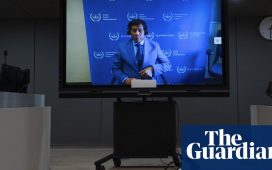At midnight on 3 November 2013, five Syrian officials dragged arts and humanities student Patrick Dabbagh from his home in the Mezzeh district of Damascus.
The following day, at the same hour, the same men, including a representative of the Syrian air force’s intelligence unit, returned with a dozen soldiers to arrest the 20-year-old’s father Mazzen.
They accused the 48-year-old education counsellor at the city’s French lycée of failing to raise his son properly. “We’ll teach you to educate him,” they said, but no specific reason was given for their arrest.
It would be the last time anyone in their family would see them. For almost five years after their arrest, nothing was heard of the men, both Franco-Syrian, until July 2018, when the authorities issued certificates stating Patrick Dabbagh had died in January 2014 and Mazzen Dabbagh in November 2017. No cause of death was given and the bodies were not returned to the family.
On Tuesday, three high-ranking Syrian officials will go on trial in Paris accused of involvement in crimes against humanity and war crimes linked to their disappearance and death.
Ali Mamlouk, 78, head of the Syrian secret services and security adviser to President Bashar al-Assad, Jamil Hassan, 72, head of the Syrian air force intelligence unit until 2019 and a member of Assad’s entourage, and Abdel Salam Mahmoud, in his early 60s, intelligence director at the notorious Mezzeh detention centre where father and son are believed to have been held, are accused of complicity in their arrest, torture and deaths.
Trials of Syrians have taken place in the Netherlands, Germany and Sweden, but it is the first time such high-ranking figures close to Assad will be held to account.
The accused will not be in court but campaigners say the case bolsters calls for universal justice and gives hope to the families of more than 111,000 people who have disappeared in Syria since 2011.
“It is historic because these are the most senior officers from the Syrian regime to be put on trial,” said Clémence Bectarte, a French lawyer representing the Dabbagh family.
“It’s important not only for the Dabbagh family but for many other Syrians. There are families of people who have disappeared who are still waiting for news of their loved ones or the bodies of those who have been killed. It’s still very much a contemporary problem.”
The Syrian conflict began with protests and Arab spring pro-democracy rallies in 2011 and escalated into civil war, with a mass uprising against Assad the following year.
More than 15,000 Syrians are believed to have been tortured to death by Syrian intelligence officials. More than 230,000 civilians, including 30,000 children, are reported to have been killed in the conflict, according to the Syrian Network for Human Rights.
Despite the war, Assad has been rehabilitated in the Arab world over the past 12 months, invited to Arab League summits and meetings with other regional leaders.
The trial highlights the growing determination of European states to prosecute crimes against humanity, war crimes and genocide under the principle of universal jurisdiction, which allows countries to try perpetrators regardless of their nationality or where the crimes were committed.
In November last year, France issued an international arrest warrant for Assad for the use of chemical weapons against civilians.
Three others, including Assad’s brother, Maher, were also indicted over the use of banned sarin gas in two attacks in August 2013 that killed more than 1,000 people, including hundreds of children.
It is believed to be the first time a sitting head of state has been the subject of an arrest warrant in a third country for crimes against humanity. A French court is expected to decide whether the investigation into Assad can go ahead later this month.
France set up a specific war crimes unit in 2012, but until now the principle of universal justice has been constrained by the requirement for either accused or victim to have a tangible connection to France, through nationality or residence.
During the French investigation that led to the charges against the three officers in the Dabbagh case, more than 20 Syrians, most of them survivors of Mezzeh prison, described conditions at the jail as well as detailing the chain of command in the intelligence services at the time the father and son were detained.
Bectarte says the trial would not be possible without their testimony of “the terrible reality of the crimes committed in the jails of Bashar al-Assad”.
“At a time when the Syrian regime seems to come out unpunished for all the atrocities committed, it is essential that this trial, part of a long fight against impunity, qualifies the regime’s crimes and hold accountable its highest officials,” she said. “The goal is there should be no escape from justice. This will not be the last trial.”
Mazen Darwish, of the Syrian Centre for Media and Freedom of Expression, added: “Beyond Mazzen and Patrick Dabbagh, there are hundreds of thousands of Syrian men and women who have died during the Syrian conflict, especially at the hands of Bashar al-Assad’s regime and whose families are still waiting for justice.”










